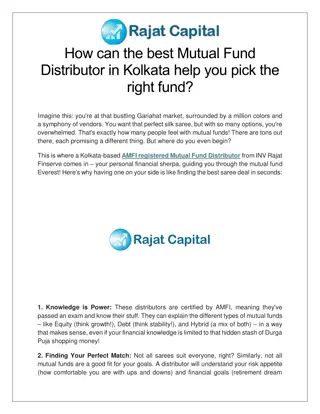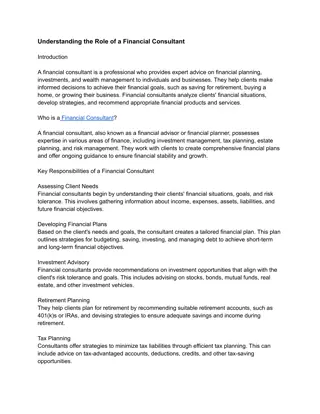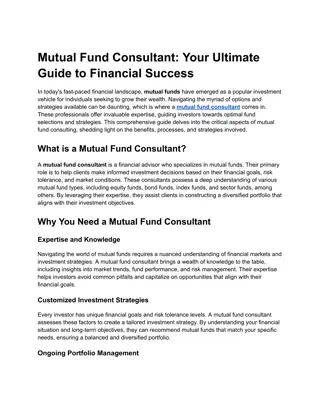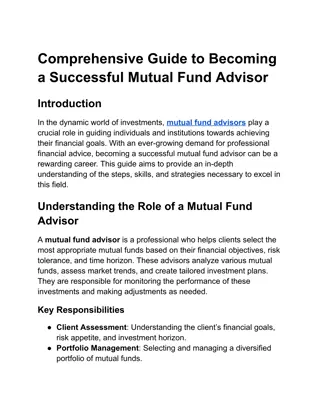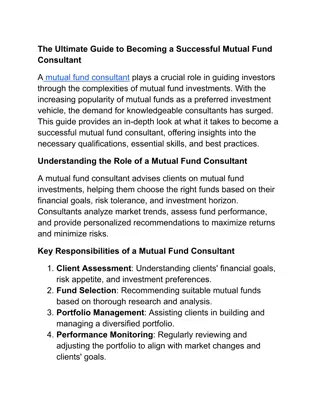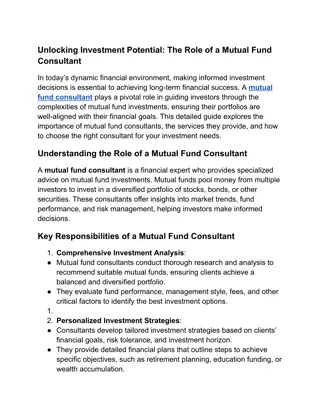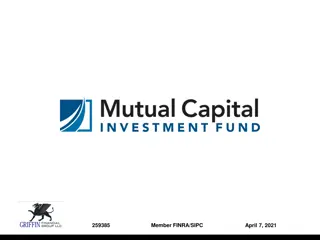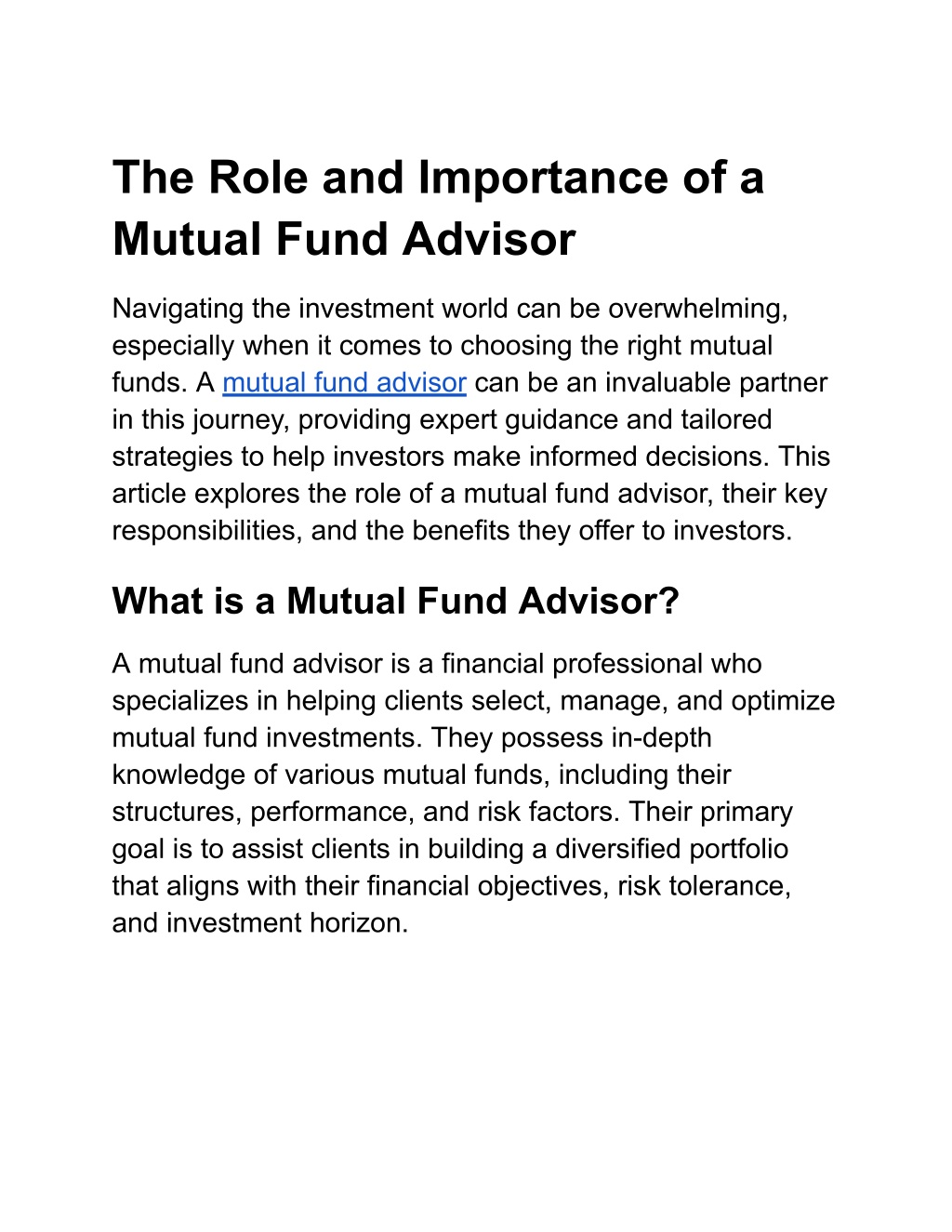
The Role and Importance of a Mutual Fund Advisor
Navigating the investment world can be overwhelming, especially when it comes to choosing the right mutual funds. A mutual fund advisor can be an invaluable partner in this journey, providing expert guidance and tailored strategies to help investors make informed decisions. This article explores the role of a mutual fund advisor, their key responsibilities, and the benefits they offer to investors.n
Uploaded on | 0 Views
Download Presentation

Please find below an Image/Link to download the presentation.
The content on the website is provided AS IS for your information and personal use only. It may not be sold, licensed, or shared on other websites without obtaining consent from the author. If you encounter any issues during the download, it is possible that the publisher has removed the file from their server.
You are allowed to download the files provided on this website for personal or commercial use, subject to the condition that they are used lawfully. All files are the property of their respective owners.
The content on the website is provided AS IS for your information and personal use only. It may not be sold, licensed, or shared on other websites without obtaining consent from the author.
E N D
Presentation Transcript
The Role and Importance of a Mutual Fund Advisor Navigating the investment world can be overwhelming, especially when it comes to choosing the right mutual funds. A mutual fund advisor can be an invaluable partner in this journey, providing expert guidance and tailored strategies to help investors make informed decisions. This article explores the role of a mutual fund advisor, their key responsibilities, and the benefits they offer to investors. What is a Mutual Fund Advisor? A mutual fund advisor is a financial professional who specializes in helping clients select, manage, and optimize mutual fund investments. They possess in-depth knowledge of various mutual funds, including their structures, performance, and risk factors. Their primary goal is to assist clients in building a diversified portfolio that aligns with their financial objectives, risk tolerance, and investment horizon.
Key Responsibilities of a Mutual Fund Advisor 1. Assessing Client Needs Mutual fund advisors begin by understanding their clients financial goals, risk tolerance, and investment timelines. This involves a comprehensive assessment of their current financial situation and future aspirations. By getting a clear picture of the client s needs, advisors can recommend the most suitable mutual funds. 2. Recommending Mutual Funds Based on the client s profile, mutual fund advisors recommend specific mutual funds that align with their investment goals. They provide detailed information about each fund, including its investment strategy, historical performance, fees, and risk factors. This helps clients make informed decisions about where to allocate their resources. 3. Portfolio Diversification Advisors help clients diversify their investment portfolios by selecting a mix of mutual funds across various asset classes, such as equities, bonds, and money market instruments. Diversification aims to reduce risk and
improve the potential for returns by spreading investments across different sectors and securities. 4. Performance Monitoring Regular monitoring of the mutual funds is a critical responsibility of advisors. They keep track of the funds performance, market conditions, and economic trends. Advisors provide clients with periodic updates and suggest adjustments to the portfolio as needed to ensure it remains aligned with their financial goals. 5. Educational Insights A significant part of a mutual fund advisor s role is educating clients about mutual funds and investment principles. They explain complex financial concepts in simple terms, helping clients understand the rationale behind their investment strategies and making them more confident in their decisions. 6. Tax Efficiency Advisors assist clients in maximizing tax efficiency by selecting mutual funds that offer tax advantages. They provide guidance on the tax implications of different investments and strategies to minimize tax liabilities while optimizing returns.
Benefits of Working with a Mutual Fund Advisor 1. Expert Knowledge Mutual fund advisors bring specialized knowledge and expertise to the table, helping clients navigate the complexities of mutual fund investments. Their insights can lead to better-informed investment choices and improved financial outcomes. 2. Personalized Investment Strategies Advisors develop personalized investment strategies based on clients unique financial goals and risk tolerance. This tailored approach ensures that investment recommendations are relevant and effective for the individual client. 3. Diversified Portfolios Through careful selection and management of mutual funds, advisors help clients build diversified portfolios that aim to reduce risk and enhance potential returns.
Diversification is a key strategy in managing investment risk. 4. Ongoing Support and Monitoring Mutual fund advisors provide ongoing support, regularly reviewing clients portfolios, monitoring fund performance, and making necessary adjustments. This continuous oversight helps keep the investment strategy on track and responsive to changing market conditions. 5. Simplified Investment Process Advisors simplify the investment process by handling the complexities of fund selection, performance monitoring, and portfolio adjustments. This allows clients to focus on their financial goals without the stress of managing investments on their own. Conclusion A mutual fund advisor plays a crucial role in guiding investors through the intricate landscape of mutual fund investments. By offering expert advice, personalized strategies, and continuous support, mutual fund advisors help clients build and manage portfolios that align with their financial goals and risk tolerance. Whether you're a novice investor or an experienced one seeking to optimize
your strategy, a mutual fund advisor can be a valuable partner in achieving your financial aspirations.


